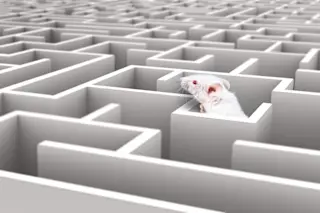It sounds like something straight out of science fiction, but it's true---human brain cells transplanted into mice's brains make the mice smarter. The results highlight how important a certain overlooked class of brain cells are in human brains. The cells in question are called glial cells
. Their name comes from the Greek word for "glue," which was long thought to be the main purpose of these cells in the human nervous system---to hold together the neurons. Scientists now think these sideline cells communicate with neurons
too, but they still take a back seat in most studies of brain function. But there's evidence that glia are pretty crucial in human cognition. Genetic studies have shown that the biggest difference in gene expression between human and mouse brains are in glial cells. And humans have many more of a certain kind of glia, called astrocytes,
than do non-primate mammals. Thus glia, ...













